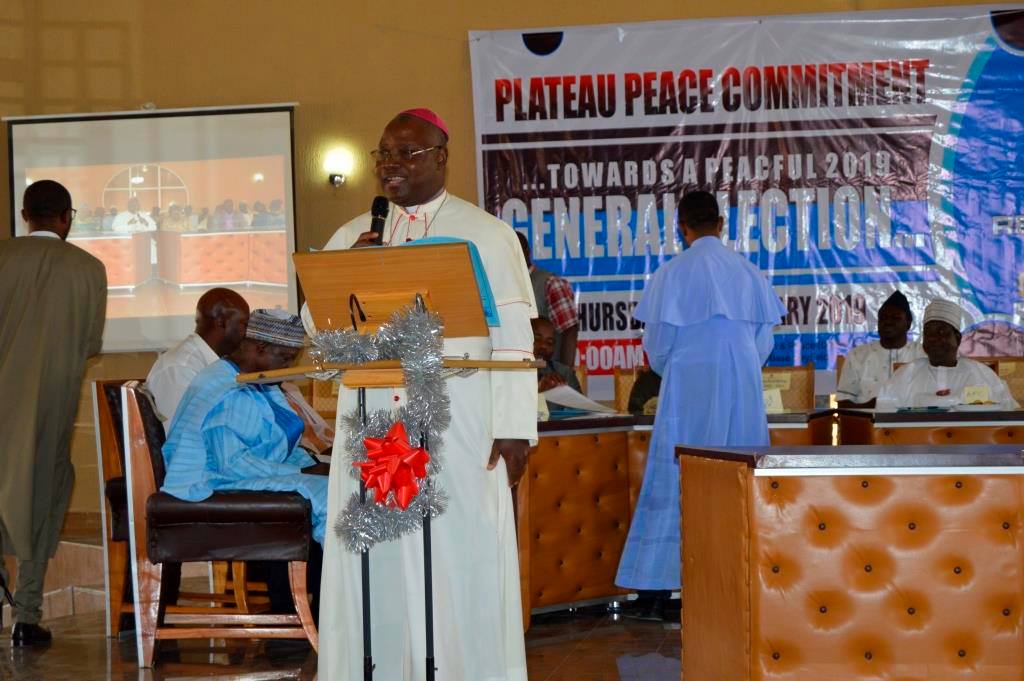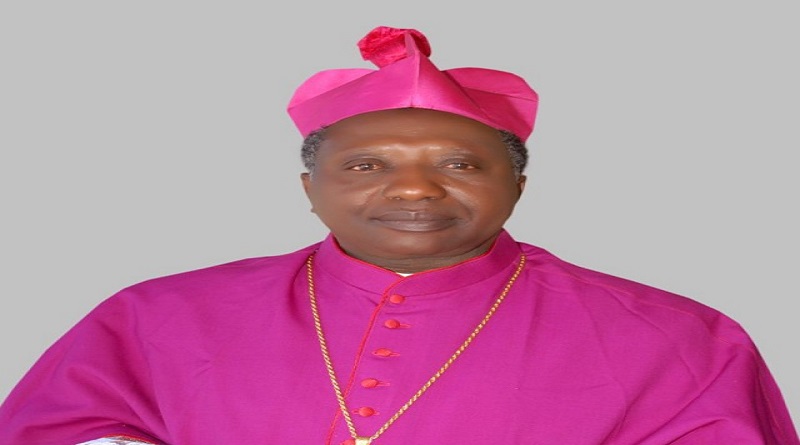The fruit of constructive dialogue and genuine discernment is lasting peace and love
by ARCH BISHOP · May 25, 2025
6TH SUNDAY OF EASTER, YEAR C, 25.05. 2025, AT OUR LADY QUEEN OF PEACE CHURCH, UTAKO. HOMILY BY ARCHBISHOP I.A. KAIGAMA
READINGS: ACTS 15:1-2,22-29; REV 21:10-14, 22-23; JOHN 14: 23-29
Theme: The fruit of constructive dialogue and genuine discernment is lasting peace and love
I am full of joy to be able to celebrate this Mass with you, the parishioners of Our Lady Queen of Peace, Utako. I was supposed to be here last Sunday, but as another duty called for a representation of the Catholic community from Nigeria at the Pope’s inaugural Mass in Rome and I was one of the delegates, I had to reschedule the pastoral visit to today. I am sorry about that. The good thing is that while attending the very solemn and impressive ceremony in the Vatican, I absorbed the pontifical inaugural Mass blessings of the Holy Father, Pope Leo XIV for myself, for you parishioners of Our Lady Queen of Peace Utako, and for the Archdiocese. I hereby pour forth the Pope’s blessings on each of you present here and on everyone in your parish and on our Archdiocese.
Today, 172 of your parishioners will be confirmed; we shall install your tabernacle and bless your chapel and Grotto. Today also, 24 students of our Spiritual Year Preparatory Seminary in Passo, Gwagwalada, will receive their soutanes, marking a significant step of their journey to the priesthood. Please pray for them as they begin formal seminary studies.
You are as aware as I am that our troubled world needs peace. I was so glad that the first words of our Holy Father on his first public outing at the loggia of St. Peter’s Basilica, Vatican City, on May 8 were those of Christ after His resurrection: “Peace be with you.” The Pope was also echoing and wishing us what Jesus said, “Peace I leave with you; my peace I give to you” (John 14:27). Because your parish church is called the Queen of Peace, may peace exude from your parish to all the nooks and crannies of our Archdiocese.
The conversion of Cornelius and his household brought some problems to the Jerusalem church (cf. Acts 11:1-3) and the only way to resolve the matter was through peaceful dialogue. A fruitful and constructive dialogue can produce real peace and love. We see how the situation among the early Christians, whereby the Greek-speaking widows were neglected in the distribution of material goods, led the apostles to make a collective decision after prayer and discernment saying, “It is not fair for us to leave behind the Word of God to serve at tables also.” (Acts 6:2). They asked that seven men of good testimony, filled with the Holy Spirit and with wisdom be appointed for the humanitarian work (cf. Acts 6:3) so that they (the Apostles) could concentrate on prayer and the ministry of the Word (Acts 6:4). This brought some peace to the community.
The immediate temptation to resort to conflict or even war is a clear manifestation of the inability to use our rational thinking to avoid the negative consequences of the absence of peace. Today, we witness international conflicts, ethnic conflicts, religious conflicts, clannish conflicts, and even conflicts in the family. This upsets society and promotes an atmosphere of fear, instability, and other forms of antisocial behaviours like banditry, terrorism, needless aggression, etc.
The first reading presents us with a critical moment in the history of the early Church, roughly around 49–50 AD, as the Church grappled with questions of identity, unity, and mission (cf. Acts 15:1-2, 22-29). Jesus and His apostles were Jews, and the earliest believers were Jewish followers who saw Jesus as the promised Messiah. They continued to observe Jewish practices like circumcision, Sabbath worship, and dietary laws, as prescribed in the Torah (the Law of Moses). But this Jewish movement began to spread beyond Judea and the gospel was reaching the Gentiles (non-Jews) across the Roman Empire, particularly in places like Antioch, a cosmopolitan city in Syria with a mixed Jewish and Gentile Christian community, through the missionary work of Paul and Barnabas. This rapid inclusion of Gentiles raised big questions such as whether these new believers needed to become Jews; through circumcision and adherence to the Mosaic Law, to qualify to be full members of God’s people. Some Jewish Christians from Judea insisted that “Unless you are circumcised according to the custom of Moses, you cannot be saved.” It is known however that salvation comes through faith in Christ, not adherence to the old Law; hence, grace, not legalism, is at the heart of salvation (cf. Romans 3:28).
The temptation to look down on others or to become too rigid or legalistic is also found among us Christians today. Some Christians believe that they are more Christian than other Christians. You hear things like Catholics worship idols hence, they are not true Christians and are damned. Even among us Catholics, we have people who believe that the church organization they belong to is superior to that of others.
The point being made today is that faith in Jesus, not Jewish customs, or contemporary pagan practices is the basis for salvation. The gathering of Church elders to resolve the dispute that arose among the believers came to be regarded as the first Council of the Church, held in Jerusalem. There was a decision reached at the Council by the apostles and the elders without arguing or voting; they discerned together as a body, what God asked of them. The phrase “it seemed good to the Holy Spirit and to us” (v. 28) mirrors the Catholic belief that the Church, when gathered in unity, is led by the Spirit to interpret God’s will. This was obvious during the recent conclave, the Holy Spirit was alive. All media speculations and human calculations succumbed to the power of the Holy Spirit. The Cardinals were guided and prompted by the Holy Spirit to choose one of them who is now Pope Leo XIV. The election was peaceful, decorous, and according to the mind of God, not according to the mind of secular man. There was no court case as would have been the case here when election results are announced, resulting in rancor and heavy expenditures in court cases and even serious physical conflicts.
The very name of this parish reminds us that Mary, our Mother, is Queen not of violence, not of wealth, not of fear—but of Peace. And it is this peace, Christ tells us in the Gospel of John today, that He leaves with His disciples. The peace which the world gives is transitory, but the peace, which Jesus gives, like all His blessings, is eternal. Nothing can take away that peace – neither sickness, nor hunger, nor poverty, nor plenty, nor life, nor death. Lasting peace is given by Christ, and Christ only. It is peace that transcends the world.
Such peace is also possible in our nation, but we know that money cannot give us peace. You must have heard the saying: You can purchase many things, but you cannot purchase peace. You can purchase soft beds, but you cannot buy sleep. You can buy good food, but you cannot buy a good appetite. You can buy a good health insurance plan, but you cannot buy good health. You can buy good books, but you cannot buy wisdom.
We all need to work for peace. If Christians today, live by the Sermon on the Mount; if the Jews live by the Ten Commandments; if Buddhists live by the teachings of the Noble Eightfold paths; if Muslims truly follow the teachings of the Prophet Mohammed, there would be peace everywhere. We read in Gaudium et Spes a critical self-analysis, and we hope each religious group will undertake a similar internal evaluation and criticism of the manner they practice their faith. Gaudium et Spes succinctly says: “One of the causes of atheism in the world is the bad example of Christians, Christians who do not really love God and do not love each other” (cf. GS 19-21). We, in Nigeria, lack the capacity and ability to sincerely criticize the bad aspects of our religious utterances and practices. We prefer to point the fingers of blame at the other religion and defend our bad or anti-social religious teachings and practices with fanatical zeal and aggressive bigotry. But as followers of Christ, we are called to be instruments of His love and peace in the world, to reach out to those in need, to show compassion and kindness to all, and to work for justice and peace. Our Church is not just for one group alone. It is for all. Let everyone who enters this church regardless of their lowly background feel loved by all of you parishioners.
Let us ask Our Lady Queen of Peace to intercede for us, especially in this month of May, devoted to her – to help our homes, our parishes, our Archdiocese, and our nation, to become places of peace, love and reconciliation.
Our Lady Queen of Peace – pray for us.




